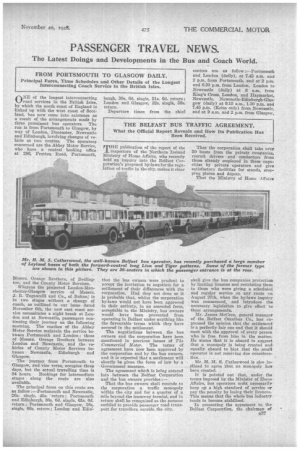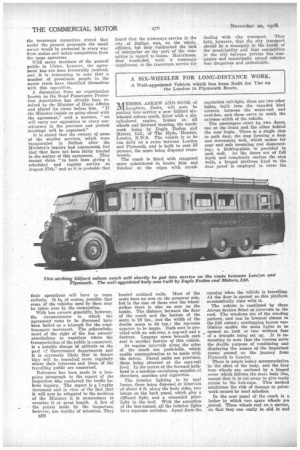THE BELFAST BUS TRAFFIC AGREEMENT.
Page 33

Page 34

If you've noticed an error in this article please click here to report it so we can fix it.
What the Official Report Reveals and How Its Publication Has Been Received.
THE publication of the report of the inspectors of the Northern Ireland Ministry of Home Affairs, who recently held an inquiry into the Belfast Corporation's proposed by-laws for the regulation of traffic in the city, makes it clear that the bus owners were prudent to accept the invitation to negotiate for a settlement of their differences with the corporation.Had they not done so it is probable that, whilst the' corporation by-laws would not have been approved
• in their entirety, in an amended form, • acceptable to the Ministry, bus owners would have been prevented from operating in Belfast under anything like the favourable terms which they have secured in the settlement.
The negotiations between the bus owners and the corporation have been mentioned in previous issues of The Commercial Motor. The terms of agreement have now been approved by the corporation and by the bus owners, and it is expected that a settlement will shortly be given the force of law by a
Government measure. • • The agreement which is being entered into . between the Belfast Corporation and the bus owners provides That the bus owners shall concede to the corporation a traffic monopoly within the city and for a quarter of a mile beyond the tramway termini, and in return shall be recognized as the persons entitled to provide passenger road transport for travellers outside the city. That the corporation shall take over 50 buses from the private companies, recruit drivers and conductors from those already employed in these capacities by private operators and give satisfactory facilities for stands, stopping places and depots.
That the Ministry of Home Affairs shall give the bus companies protection by limiting licences and restricting them to those who were giving a scheduled and regular service on any route on August 27th, when the by-laws inquiry was commenced, and introduce the necessary legislation to give effect to these arrangements.
• Mr. James McCrea, general manager oU the Belfast Omnibus Co., has expressed the opinion that the settlement is a perfectly fair one and that it should • meet with the approval of every person • who is free from bias in the matter. He states that it is absurd to suggest • that a monopoly is being created and equally absurd to hint that the 'small • operator is not receiving due considera tion. . • Mr. H. M. S. Catherwood is also inclined to agree that no monopoly has been created.
It is pointed out that, under. the terms imposed by the Minister of Home Affairs, bus operators must necessarily keep up a high standard of service or pay the penalty by losing their licences. This means that the whole bus industry tends to become stabilized.
In presenting the agreement to the Belfast Corporation, the chairman of B37
the tramways committee stated that under the present proposals the small owner would be protected in every way from undue and unfair competition from the large operators.
Path many members of the general public in Ulster, however, the agreement has not been favourably received, and it is interesting to note that a number of prominent people in the motor trade have identified themselves with this opposition.
A deputation from an organization known as the Road Passengers Protection Association has already been received by the Minister of Home Affairs and placed its views before him. " If the Minister insists on going ahead with the agreement," said a member, "we will carry our opposition to every constituency in the province and protest meetings will be organized."
It is stated that the owners of some of the smaller services, which were inaugurated in Belfast after the Ministry's inquiry had commenced, feel that they have not been fairly treated in the matter of this agreement. They cannot claim "to have been giving a scheduled and regular service on August 27th," and so it is probable that their operations will have to cease entirely. It is, of course, possible that some of the vehicles used by them may be taken over by the corporation.
With bus owners generally, however, the circumstances in which the agreement came to be discussed have been hailed as a triumph for the road'. transport movement. The acknowledgment of the right of the bus owners' associations to negotiate where the transportation of the public is concerned, is a notable change of attitude on the part cf Government departments and it is extremely likely that in future they will be consulted more regularly where their interests, and those of the travelling public are concerned.
Reference has been made in a foregoing paragraph to the report of the inspectors who conducted the traffic bylaws inquiry. The report is a LngthS document and in view of the fact that it will now be reiegated to the archives of the Ministry it is unnecessary to examine it at great length. A few of the points made by the inspectors, however, are worthy of attention. They
3388
found that the tramways service in the City of Belfast was,, on the whole, efficient, but they condemned the lack of 'enterprise onthe part of the committee in regard to buSes. Motorbuses, they concluded, were a necessary supplement to the trainsvays service for •
dealing With city transport. They held, however, that the city transport should be a monopoly in the hands of the municipality and that competition in the city between private bukCcom • panics and _mtinicipally owned' vehicles was dangerous and undesirable.








































